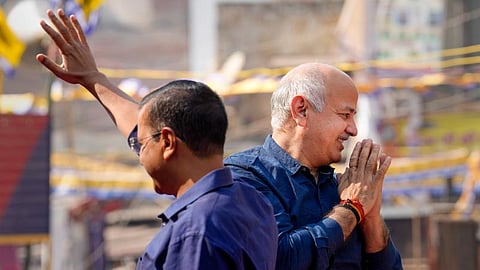

On his release from the Tihar Jail after getting bail in a corruption case last Friday, Delhi Chief Minister Arvind Kejriwal delivered a very passionate speech in front of the waiting television crews. He said that he has come out stronger to wage his battle against Prime Minister Narendra Modi and explained how he intends to fight with the Bharatiya Janata Party (BJP)-led centre on the various fronts.
Nowhere during the passionate speech, however, did he mention how would his release contribute to governance of Delhi and ameliorate the miseries of the residents of the national Capital, which stands sunken in the monsoon rains. He had no words of condolence for the citizens who got drowned in the overflowing drains or electrocuted in the stagnant waters.
This received widespread criticism as people of Delhi are reeling under exceptional miseries and Kejriwal failing to take notice of the same was denounced from newspaper editorials to television debates. Following the criticism now he has said that he would resign as the Chief Minister.
Politically, Delhi being the nerve centre of the AAP, having started from here and first formed the government in the city, the party no further could allow the directionless drift. The question being increasingly asked was could AAP afford to go the polls with a ‘non-functional’ Chief Minister. Thus the announcement by Kejriwal to resign.
But in Kejriwal’s announcement there is more than what meets the eyes. Kejriwal said, “I want to give ‘agnipariksha’ after coming out of jail. I will become chief minister, Sisodia deputy CM only when people say we are honest.” He added that the new Chief Minister will be appointed and the decision would be taken at a cabinet meeting in the next two days.
This effectively pre-empts any move to make the second in command of the party Manish Sisodia the Chief Minister. Sisodia had resigned as the Deputy Chief Minister on being sent to the jail and when he came out no such pre-conditions have been put on him to not function as a Minister as put on Kejriwal.
Thus legally nothing stops Sisodia from becoming the Chief Minister, as his case is similar to that of Hemant Soren in Jharkhand. The Jharkhand Mukti Morcha (JMM) leader resigned before being arrested and again took oath of the office on coming out on bail. The same could be taken as precedence and Sisodia sworn in, but Kejriwal through his speech has made it clear that his deputy was not in the reckoning.
Theoretically replacing Kejriwal with another leader is easier said than done. Given the Swati Maliwal episode, the trust factor among the AAP leaders has taken a huge nosedive. There are so many aspirants and the strongest being Chief Minister’s wife Sunita Kejriwal and his former deputy Manish Sisodia, who too has come out on bail after a long stay in Tihar Jail.
Sisodia’s claim has been neutralised by the Chief Minister putting him in the same category as himself, which is incorrect. Given Sisodia’s influence among the cadres, he is seen as someone who can upstage Kejriwal. The ambitions of the other leaders cannot be ruled out. While Sunita Kejriwal’s acceptance can be forced but then this could further erode Kejriwal’s moral credibility.
Coming to the demand of holding early elections by dissolving the House, Kejriwal knows that unlike the states, the Lieutenant Governor of Delhi is not bound by the advice of the Cabinet. Even if he recommends, it has to go to the Ministry of Home Affairs (MHA) which has to take a final call on the matter.
Even if the MHA agrees to dissolve the House, the call for holding the polls would be taken by the Election Commission of India. Since the present House has just about six months of life left, the EC may decide to hold polls as scheduled in March. In that situation, Delhi would continue to drift like a ship with engines not functioning.